Nine Questions With Nyarko Twum Berima
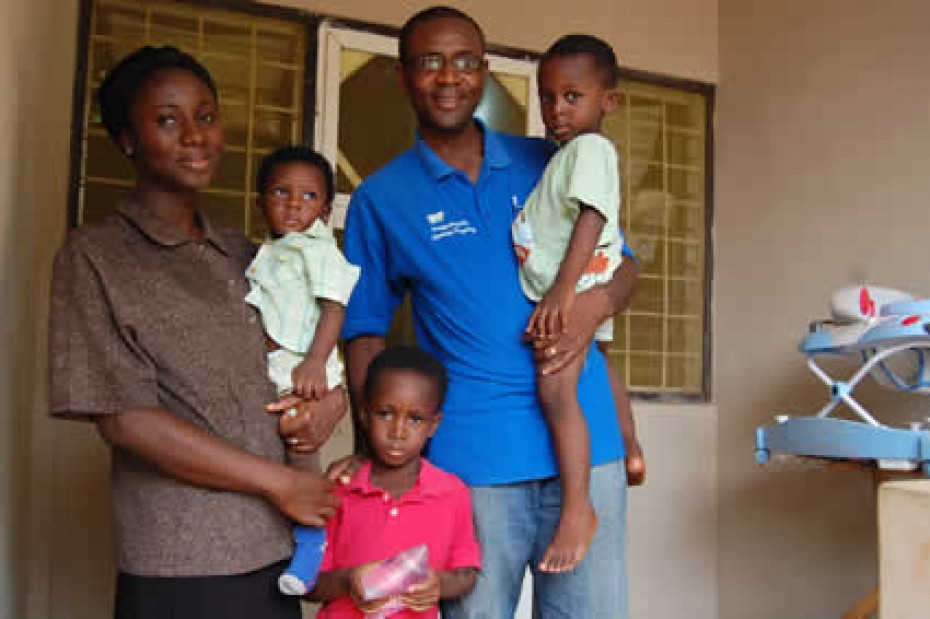
I believe that God places us in our jobs, so to me every position is a privilege given by God. I want to be here to serve, learn and grow.
Continue Reading ›10 Questions With Kenia Servellon
1. How long have you been in your current position with Compassion El Salvador, and what is your job?
Two years. I am a supervisor within the Sponsor Donor Services department.
2. What are the main responsibilities of your position?
I make sure the sponsors have up-to-date information about the children. Not just the letters, but also new cases. I keep the biannual report updated. I make sure that pictures and information are high quality and are sent on time.
3. What is an average day like for you? (more…)
Continue Reading ›10 Questions With Jeimy Reyes
1. How long have you been in your current position with Compassion Honduras, and what is your job?
Seventeen months. I am an auditor.
2. What are the main responsibilities of being an auditor?
Identifying the strengths and weaknesses of the partner church as well as the challenges it faces.
We look for strengths so that these can be used as a support for other churches. We look for weaknesses and challenges so we can suggest solutions and give the appropriate follow-up in order to correct and solve problems in the churches.
In other words, we hope to provide necessary and timely support to the church.
3. What does an average day look like for you? (more…)
10 Questions With Lilliam Sánchez
Lilliam Sánchez has been married to her husband, Francisco, for six years, and they are pregnant with their first child. She is the youngest of three sisters and one brother.
Lilliam was born in Ciudad Sandino, and she and her family have lived there for many years.
Lilliam is an active member of Betania Baptist Church. She has been at that church for nine years, serving as Sunday school teacher and church secretary. She’s worked for Compassion since 2003 and has been a Partnership Facilitator (PF) since October 2007.
1. What are the main responsibilities of your position?
As a facilitator, I help strengthen the church to reach results in the four areas of our work with children: spiritual, emotional, cognitive and physical.
For example, in the physical area, we want children to choose good health habits and to be healthy, so I try to see if that result is being reached or not, because we don’t want it just to be written in paper.
In the cognitive area, it is not about spending more money on a computer course for the children. It is about the child’s learning and how he or she is using the resources. And so on in each area.
The church partner also gives clear information of how the budget is being used, and facilitators help them in this administrative area.
I want to be clear and let you know that the results aren’t seen from one day to another. It is a process.
I believe my responsibility is to help churches become self-sustaining. I don’t want children to be sponsored the rest of their lives. I want a generation that can support themselves and sponsor other children.
I want churches spiritually and economically strong, to be light in the midst of darkness.
This also is a process. It might not be seen in one, two or five years, but we are putting the foundation down now to make them strong to reach maturity.
2. Describe what an average day is like for you.
I have two facets. One is the work I do at the office and the other, the work I do in the field.
The partnership facilitator’s role has changed and I spend most of the time in the field, supporting directly the partner churches.
Normally, I have one day at the office (Monday) to do the office work, like follow-up funding and reporting. I also coordinate monthly activities and evaluate activities of the previous month in the PF meeting, analyzing achievements and weakness to look for better alternatives.
The other four, five or six days (because sometimes I work Saturday and Sunday, if necessary), I am with the church partner. It is arduous work seeing how the children are doing, how the church is working, and looking for alternatives to do better work. Results aren’t be achieved if I stay at the office.
3. How many churches do you visit a day, and how often do you visit a church? (more…)
Nine Questions With Cesiah Magaña
You asked your questions of Cesiah, field communication specialist in Mexico, and she answered. Take it away, Cesiah.
1. First of all, thank you so much for all you do for the precious children of Mexico! My question is, as you go through each day seeing a multitude of needs in these children’s lives, what do you find yourself praying for most often? (Lindy)
Most of the time, I pray for their hearts. My main prayer is normally that they get to experience the love of Christ. I long for them to know how precious they are to God. I pray that they never give in to the idea of not being worthy or good enough to do anything they dream of.
2. How far do the students travel, on average, to get to the centers and how do they do so? (Walk, bus, etc.) (Beth Ingersoll)
Most of the children registered live very near the churches where they participate in the activities and where they are registered. It is very common for them to walk. As part of the program, Compassion Mexico considers children within 30 minutes walking distance.
In some of the child development centers, it is common to see a few children ride their bicycles to the center, but in those cases it is only a luxury some can afford.
There are other churches where the pastor’s vehicle or the cars owned by the church membership serve to bring children to classes. Every time they drive by the community, children line up to jump in and ride to the church. Many times these are old cars on bumpy and dirt roads, but the fact of being able to ride with the teachers or sparing the hot sun is well worth the tightness.
Finally, there are centers where teachers and staff members split by areas, and they walk the streets around the center to bring children in. Families then trust their children to go with the staff members to church.
Either if children walk by themselves or in big groups or ride their bikes to the projects, they normally wear a special shirt from the project or even uniforms, so it is very nice to watch children come into the centers because they fill the streets with joyful laughter.
7 Questions With David Adhikary
Thanks for asking your questions of David, the Compassion field communication specialist in Bangladesh. Here is the wisdom he has to share with us!
1. First of all, thank you so much for all you do for the precious children of Bangladesh! My question is, as you go through each day seeing a multitude of needs in these children’s lives, what do you find yourself praying for most often? (Lindy)
You are always welcome. Actually, I feel a deep pain when I find myself in a position where I can’t afford to help each of my children to solve their problems.
Every night I pray that at least they could have their dinner and have a sound and peaceful family environment.
2. I would like to know the specifics of how the global food crisis is affecting the people in Bangladesh and how it has affected Compassion’s program there. Have you cut back days that the children meet? Has it made a difference in the type of food that you can afford to serve the children? (Cheryl J)
The price of rice and other food products including lentils, flour, oil, and sugar are increasing continuously from last year.
According to different sources, the cost of the cheapest rice has increased by over 90 percent, and for the better grade rice, it is over 64 percent.
According to the statistics provided by the World Bank and United Nations, the daily income of a lower-level person in Bangladesh is between $1 and $2.
Each family requires at least four pounds of rice each day, which means if they only buy four pounds of the cheapest rice, they have to spend $1.18, which means they have little or no money left to buy vegetables, oil, and other food products.
Compassion Bangladesh hasn’t cut back the number of days that the children meet. Instead, we started an extra day of Compassion program.
Most of the child development centers provided a meal five days a week, but now they are providing a meal six days a week.
Some centers had to reduce their expense for food revenue; they decreased the quantity of food.
After receiving the support of the Global Food Crisis fund, this lack has been filled and children are getting food according to the new, revised menu.
Your support and prayer made it possible.
3. How far do the students travel, on average, to get to the centers, and how do they do so? (walk, bus, etc.) (Beth Ingersoll) (more…)
Ask the Field: Bangladesh and Mexico
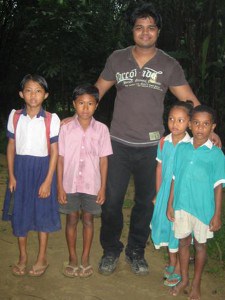 Remember Kamrul, the cycle van driver from Bangladesh you helped buy a cycle van for? Well, David Adhikary is the fine field communication specialist in Bangladesh who reported that story for us. That was one of his first assignments — he just started at Compassion Bangladesh in January. What a nice welcome you gave him!
Remember Kamrul, the cycle van driver from Bangladesh you helped buy a cycle van for? Well, David Adhikary is the fine field communication specialist in Bangladesh who reported that story for us. That was one of his first assignments — he just started at Compassion Bangladesh in January. What a nice welcome you gave him!
Now it’s your turn to ask David about his experiences as a Compassion employee, visiting precious sponsored children, and anything else you’re wondering about Bangladesh.
I’ll tell you a bit about him first. He just finished his electrical engineering degree in December of 2007 when he decided that he wanted to serve the Lord by working with Compassion’s ministry. (An engineer and a writer — talented guy!) He loves English and Bengali literature and is a big sports fan too.
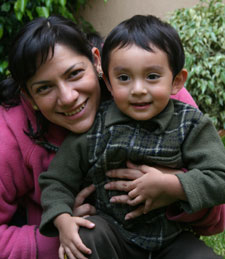 Remember when Chris went to Mexico? He got to meet Cesiah Magaña, who has been working with Compassion Mexico for seven years. She says the seven years have been wonderful — filled with blessings and challenges.
Remember when Chris went to Mexico? He got to meet Cesiah Magaña, who has been working with Compassion Mexico for seven years. She says the seven years have been wonderful — filled with blessings and challenges.
She currently works as the communication specialist, is married and has a precious 2 1/2-year-old son, Jair. She loves driving with her family to the towns around Mexico City, seeing their handicrafts and hearing their stories.
So it’s time to ask your questions of Cesiah and David. I’ll choose ten questions for each of them to answer.
10 Questions With Roberto Medrano
Your curiosity about out country staff is exciting, and again we have 10 questions that will inform and inspire you to help fight for children in poverty.
We asked Roberto Medrano, communications and trips specialist for Central America and the Caribbean and a member of our El Salvador staff, to answer some of your questions.
1. I just found out that one of my sponsored children has been sponsored four times in the past six years. I was wondering what type of effect this has on children. Do they get to the point where they are not even excited to be sponsored anymore? Is this a common occurrence? (Cindy)
To be completely honest, yes. Some of the children have received the sad news several times that their sponsors canceled. If that has happened several times, the children think something is wrong with them.
It is amazing the influence a sponsor can have on the child. For example, I remember a 25-year-old Compassion graduate. She is a Christian who is married and has two babies. She also serves as a center worker. Even though she is an adult and loves Compassion’s ministry, she always cries because in the 15 years of sponsorship her sponsor did not write one single letter. She wrote her sponsor dozens of letters, but she never received any response.
2. What are the great things about El Salvador that you want us to know about? Tell us about a particular strength or something special about the people of your country. (Lisa Miles)
El Salvador is the smallest country in the Americas, but our people have a great heart. In Central America they call us the smiling country, and I think that is a special thing about our people. We have faced earthquakes, hurricanes, civil war, and poverty, but in any problem if you ask a Salvadoran, “How are you doing?” he or she will say with an honest and warm smile, “It’s all good!” Our people are very positive and enthusiastic, and they have warrior hearts that can overcome any disaster or negative situation.
10 Questions With Ephraim Lindor
Thank you to all of you who submitted questions for Ephraim, my esteemed colleague in Haiti! As you all were curious cats and asked more than 10 questions, I picked 10 that I thought were representative of all the questions.
As I mentioned before, Ephraim has got a lot of perseverance. Check out the Compassion Haiti staff photo from 15 years ago. He’s one of only two staff members still remaining.
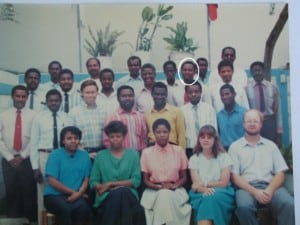
Haiti is economically considered one of the poorest countries of this hemisphere. However, this country is also unique in its natural and culturally diverse resources.
The Haitian is born with the ability to make the most beautiful artwork in the world. No matter the social class he is issued, the Haitian is capable to transform the simplest raw materials into the most enjoyable items. The Haitian paintings are of the greatest imagination, along with our sculpture in wood, steel, or stone.
Although most of its natural resources are unexploited, Haiti is one of the countries with the most beautiful beaches in the Caribbean.
Besides all of its artistic ability, most of the educated Haitians speak up to four languages: Creole (native language), French (official), English, and Spanish with proficiency.
2. I would love to hear your favorite story of children in your programs whose lives were really turned around by being part of Compassion. (Amy)
There are so many success stories that I could share but there this one that is unique to me. It is about a boy named Zaccalot. (more…)
Ask the Field: El Salvador and Haiti
Okay, everyone. Limber up those fingers. It’s time for the next round of Ask the Field. It’s time for you to ask questions of two of my fabulous coworkers, Ephraim Lindor of Haiti and Roberto Medrano of El Salvador.
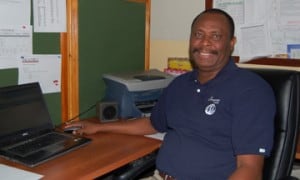 Ephraim has been working with Compassion Haiti for 22 years. (Talk about perseverance!)
Ephraim has been working with Compassion Haiti for 22 years. (Talk about perseverance!)
He first worked for Compassion as a translator, and he is now the field communications supervisor for Haiti. His daily work includes interviewing Compassion beneficiaries and writing stories about their success.
Ephraim is always smiling, and he loves watermelon. Besides all the work he does for Compassion, he’s a pastor at his local church, a loving father of a 21-year-old woman and a 15-year-old boy, and a loving husband of 23 years.
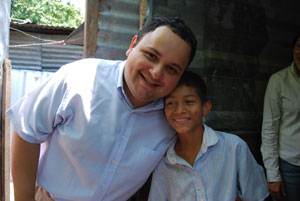 Roberto has been working with Compassion El Salvador for 6 years. He first worked for Compassion as field communications specialist and now he is the communications and tours specialist for Central America and the Caribbean, which means he is in charge of training and supporting all Compassion countries in that region for communications and tours. (He’s a busy guy!)
Roberto has been working with Compassion El Salvador for 6 years. He first worked for Compassion as field communications specialist and now he is the communications and tours specialist for Central America and the Caribbean, which means he is in charge of training and supporting all Compassion countries in that region for communications and tours. (He’s a busy guy!)
Roberto is the youth pastor of his church, and although he is just 30 years old, he has been preaching for more than 26 years. He was a child preacher, and that is one of the reasons why he loves Compassion’s ministry — he has witnessed first hand the impact of God’s Word when you are a child. He is crazily in love with his beautiful wife, Yolanda, an ORU graduate that fully supports him in working on behalf of children.
So now it’s your turn to ask away! You know the drill by now — I’ll choose 10 of your questions for them to answer.
10 Questions With Dennis Tumusiime
10 questions? Yes. You asked ’em.
10 answers? Yes … kind of. They’re just not all in this post.
Here we go. 10 Questions With Dennis Tumusiime, a tours and visits specialist with Compassion Uganda.
1. Do the families that Compassion works with have a pretty good understanding about what the program entails, and are they open to their children being evangelized? Is there a balance between being so desperate that they feel they must enroll their children and thus expose them to the gospel in order for them to be educated and fed? (Kalaya G)
I’d say that 80 percent of the communities where child development centers are located have an understanding [at least partially] of our program components. There have been instances where children are denied the benefits of the programs by their parents because the parents have different beliefs and norms, but like you said, they are compelled to enroll the children because of lack of supplies to the children’s needs.
2. What are the qualifications for the project workers to work at the child development centers? (Kayla)
Each position, be it health, finance, or sponsor donor ministry has a professional element that an aspiring candidate should have. But Compassion also has a holistic approach to the work we do, and the same idea applies to the workers in the child development centers; they should be holistically qualified –- not just academically qualified. The applicant’s spiritual status matters, and it is paramount.
10 Questions With Edwin Estioko
Recently, we gave you the chance to ask Edwin Estioko, our Field Communication Specialist in the Philippines all your burning questions about himself, the Philippines and Compassion in the Philippines. Here are his answers …
1. Can you tell about the time when you first decided to work for Compassion? (Catherine)
Before Compassion I was production manager for OMF Literature (the biggest Christian publisher in the Philippines) and a writer of children’s books. I grew up at church serving and teaching little children; playing with them and just enjoying their company. When I saw the ad for a Communications Specialist for Compassion International in the Philippines, I was literally drawn in. Feeling a strong sense of peace and confidence that the Lord was calling me to this beautiful ministry for children, I applied for the post and on the same week filed for resignation from OMF despite not knowing for sure whether Compassion would hire me or not. Thank God they did.
2. What goals do you hope to accomplish in your area? (Jason)
I hope that through the photographs I take and stories I write about Filipino children I could reach as many readers as I can around the world so that more and more people would stand up for children and advocate for them, so that more and more could see that thousands of children and families here in the Philippines truly lack opportunities for a better life (or simply for a livable minimum) despite the fact that they are hard working and full of faith.
What drives me is Proverbs 31:8, “to speak up for those who cannot speak for themselves.”
3. What have been the toughest times of your life, and what have you learned from these trials? (Juli Jarvis) (more…)

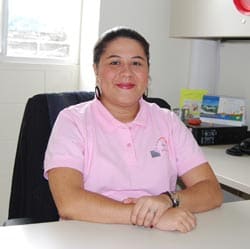 I make sure the sponsors have up-to-date information about the children. Not just the letters, but also new cases. I keep the biannual report updated. I make sure that pictures and information are high quality and are sent on time.
I make sure the sponsors have up-to-date information about the children. Not just the letters, but also new cases. I keep the biannual report updated. I make sure that pictures and information are high quality and are sent on time. 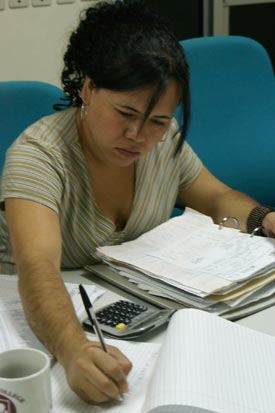 Identifying the strengths and weaknesses of the partner church as well as the challenges it faces.
Identifying the strengths and weaknesses of the partner church as well as the challenges it faces. 
